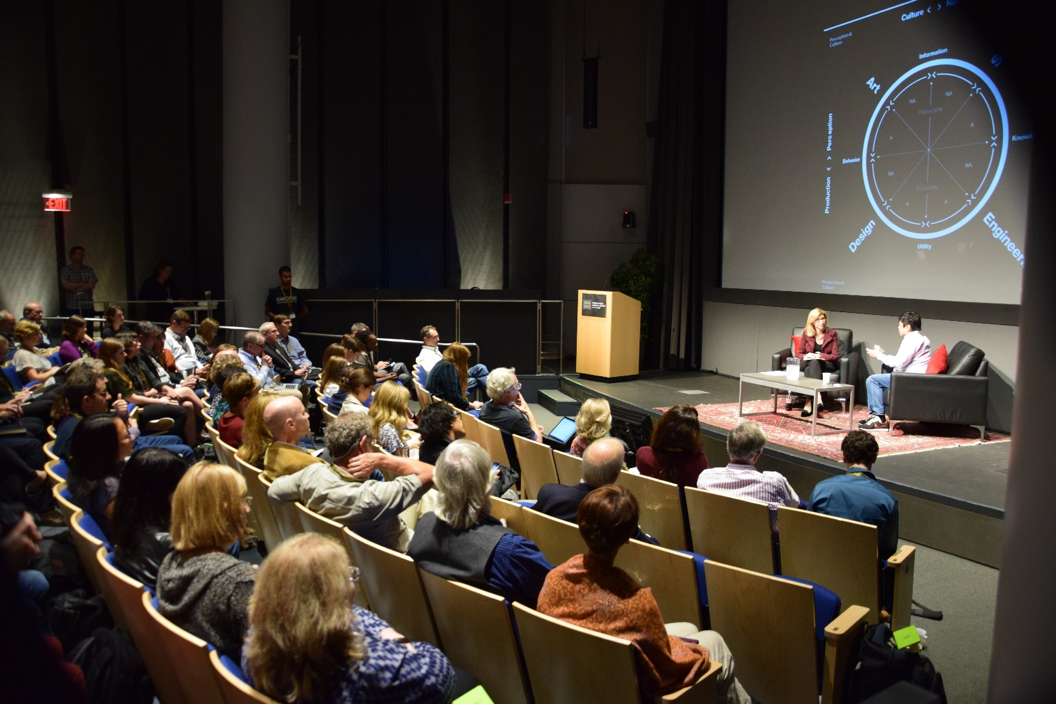Artificial intelligence: The idea of “thinking machines” discussed at SMASH16 sparked interest, excitement, and denial around the world. This post is part of our ongoing SMASH Reflections series, authored by our inaugural class of Fellows. By Israel Bionyi The 2016 Science and Media Awards Summit in the Hub (SMASH16) celebrated the best works of science in media, highlighting the need to effectively communicate science and creating synergies between the scientific community and the media world. Big science stories, trends in science media, insights around science topics relevant to food, evolution, astrophysics, biodiversity, forensics, big data, neuroscience, and sound were discussed in a variety of panels. A keynote by Joi Ito, director of MIT Media Lab on Tuesday, 20 September 2016, moderated by Paula Apsell Senior Executive Producer at NOVA, discussed the potential of disruptive technologies in shaping the future of societies, including artificial intelligence and bitcoin. Ito discussed two types of Artificial Intelligence (AI): artificial general intelligence (AGI), a machine system that could successfully perform any intellectual task a human being can, and specialized AI, often called machine learning, which appears in self-driving cars, the algorithms of Facebook and Google, and predictive policing. “My focus is specialized learning, things like machines assisting judges determining bail and things like driverless cars,” Ito said. “AI or any kind of machine learning system isn’t programmed. What happens is that an algorithm is created and trained with data, much more like raising a kid.” But do we need thinking machines or automated things that act like humans and could control certain aspects of our lives? On the streets of Boston, Uber drivers are terrified by the idea of driverless cars. Christopher Obazee, 35, from Nigeria, makes $4,000 a week from Uber as a full-timer. His colleague, Mohammed, 55, from Morocco, makes $60 a night as a part-timer. Both Uber drivers worry that they will not be able to provide for their families both in the US and back in Africa if driverless cars take away their jobs. “I have heard about AI before, and the idea that we are going to have automated cars really scares me, because it is going to put many people out of jobs,” said Mohammed. However, Ito’s argument during the keynote focused more on quality of work and safety. “If you spent enough money building a driverless car kind of quality like Google has in the streets and you eliminate humans driving cars, it would be much safer today,” Ito stated. In all, whether linguists, scientists, researchers, businesses or philosophers, people from same industries often have divergent interests on AI and equally opposing concerns. At the heart of the Netherlands in the city of Ede, located directly between the large cities of Utrecht and Arnhem in the province of Gelderland, a social worker, Annemieke Eshuis, was exposed to Ito’s prospect of AI through machines and robots that played key medical roles, such as “huggable robots” in hospitals and doctors’ “consulting robots”. “If you start putting robots around patients as doctors and social workers, I really feel we are going the wrong way,” said Eshuis. “The purpose of life is to love and to be loved, to have intimate relationships. We need trust from two sides to build a relationship; a robot doesn't have a heart, so you cannot have real communication with a robot. As a social worker, I see that people want to share their heart’s feelings. They want to sense that you are listening to them; they can feel that in their hearts if you really do.” In rural towns and villages of Cameroon, rural chiefs and natives reacted to the concept of AI. Nehemiah Yumoh, a native of Bangolan (found in the Northwestern part of Cameroon) who now resides in Germany, said this technology is out of place in the African context. Like many chiefs interviewed about AI, Yumoh will fight it with his last bone, because otherwise “the value and place of man will disappear,” he said. “Besides, robots are strange to an African man and I think something like that is certainly not welcome in Bangolan”. But Janis Sacco, Director of exhibitions at Harvard Museums of Science and Culture, sees the potential for AI to help preserve African cultures and heritage. She believes that documenting, digitalizing, and archiving historical traditions and practices in machine learning systems could prevent them from disappearing. Whether we agree with AI or not, machine learning systems is a reality today and it is proving effective to ensure safety and productivity. Despite risks, research and development on AI is continually advancing and we are going to learn to have a world where we trust robots to perform certain tasks. Further resources View Joi Ito’s keynote on Facebook About the author: Israel Bionyi is a freelance reporter, communications specialist, and environmental blogger specializing in climate change, water, energy, forests, and wildlife conservation. He founded the blog ‘The Wink Writes’ and contributes to Fairplanet magazine and Cameroon’s Standard Tribune. He is also Assistant Editor for the Society for Conservation Biology’s African Conservation Telegraph and a member of the International League of Conservation Writers. Stay connected Following SMASH on Twitter, #sciencemedia, and Facebook.
0 Comments
Leave a Reply. |
AuthorAs the curators of the Science Media Awards Summit in the Hub (SMASH), we believe storytelling is a common thread in our shared human experience, and that new media allows us to convey the wonders of scientific discovery in new and compelling ways. Archives
October 2018
Categories |


 RSS Feed
RSS Feed